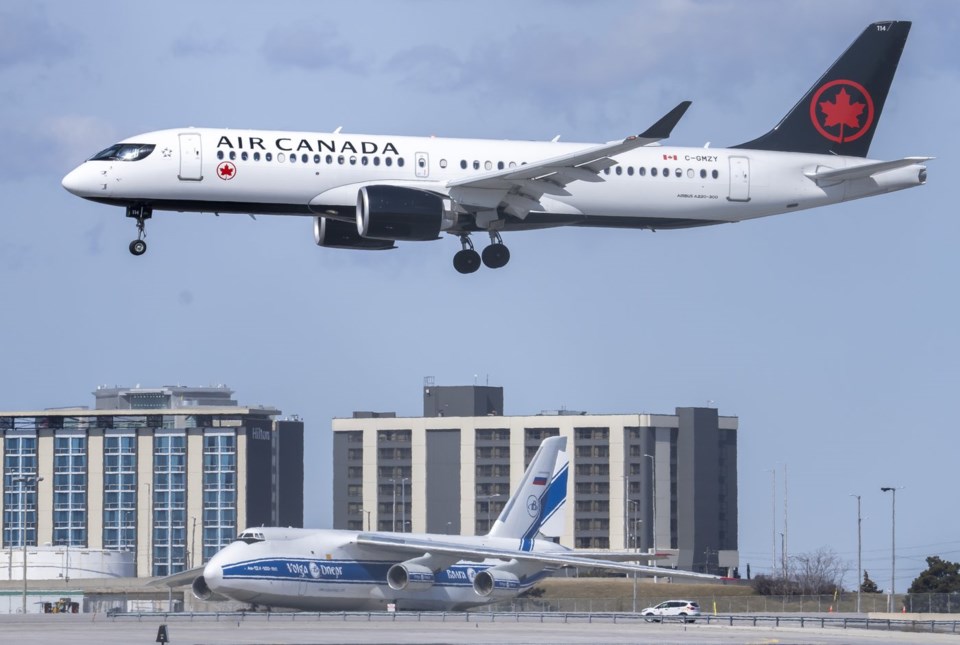OTTAWA — The federal government has taken administrative steps to help gain full control over a massive Russian cargo plane parked in Toronto, which Ottawa hopes to use to generate financial support for Ukraine.
"This looks like it's the government gearing up for its forfeiture of that aircraft," said William Pellerin, an Ottawa-based trade lawyer with the firm McMillan LLP.
He says he expects the government "to move very quickly on this forfeiture, imminently" by seeking a court order to render the plane property of the Crown.
In June 2023, the federal government officially seized an aircraft that had been sitting on the tarmac at Toronto's Pearson International Airport since February 2022. The plane hasn't moved in the intervening 25 months.
The Russian-registered Antonov AN-124 is owned by the firm Volga-Dneper, which Canada has sanctioned. It is one of the largest aircraft in the world, and Ottawa fears Russia could use it to deliver military supplies in its invasion of Ukraine.
In June 2023, Ottawa issued a formal cabinet order to seize the plane, ahead of a formal court process to have it forfeited to the Crown. At that point, Moscow warned that relations with Canada were "on the verge of being severed."
Months later, Ottawa has effectively retracted its original cabinet order and revised it, to apply to foreign subsidiaries of the Volga-Dneper company. That includes sanctioning corporate subsidiaries based in Ireland and the Netherlands, as well as individuals the Canadian government suspects of "ownership interests" in the airplane.
The changes appear in an order-in-council as well as a formal gazette notice, both of which were dated Feb. 14.
"Normally when you sanction (a company), all of its subsidiaries are expressly themselves sanctioned. And so you would never expressly then sanction subsidiaries, especially non-Russian subsidiaries, under the Russian regulations," Pellerin said.
He said it seems Canada is trying "to make sure that it has everything it needs when it moves to court" because the two regulatory changes "make no sense, unless the government is imminently about to formally forfeit that aircraft to the Crown."
Russia has claimed that Ottawa is undertaking an illegal expropriation, and Volga-Dneper argues Canada is violating the terms of the 1989 foreign investment protocol that Moscow signed with Ottawa, which has applied since the days of the Soviet Union.
The company alleged last August that Canada has cost it upwards of $100 million U.S.
Mark Kersten, an international law professor at the University of the Fraser Valley, said it's "remarkable" Ottawa hasn't actually filed paperwork to take full control of the airplane, more than a year after seizing the property and pledging to gain full control of it.
"These moves that Canada is making have the potential to create incredible precedents," he said, arguing Ottawa should be regularly updating Canadians on its efforts to seize Russian assets and send revenues to Ukraine.
It's unclear whether Ottawa would sell the airplane in its current state, use it to generate profits or strip the aircraft for parts. Kersten noted that it's possible the plane might not be able to fly in its current state, given the need for airplanes to be maintained and regularly flown to be operational.
The Canadian Press has contacted Global Affairs Canada and the Russian embassy in Ottawa for comment.
Canada is the first G7 country to introduce a law that allows it to both seize assets held by sanctioned people and divert the proceeds to victims of a sanctioned regime.
A Senate report warned last month that the law could put Canadian companies abroad at risk, and could undermine the rule of law if the provisions aren't enforced through due process.
This report by The Canadian Press was first published Feb. 27, 2025.
Dylan Robertson, The Canadian Press

